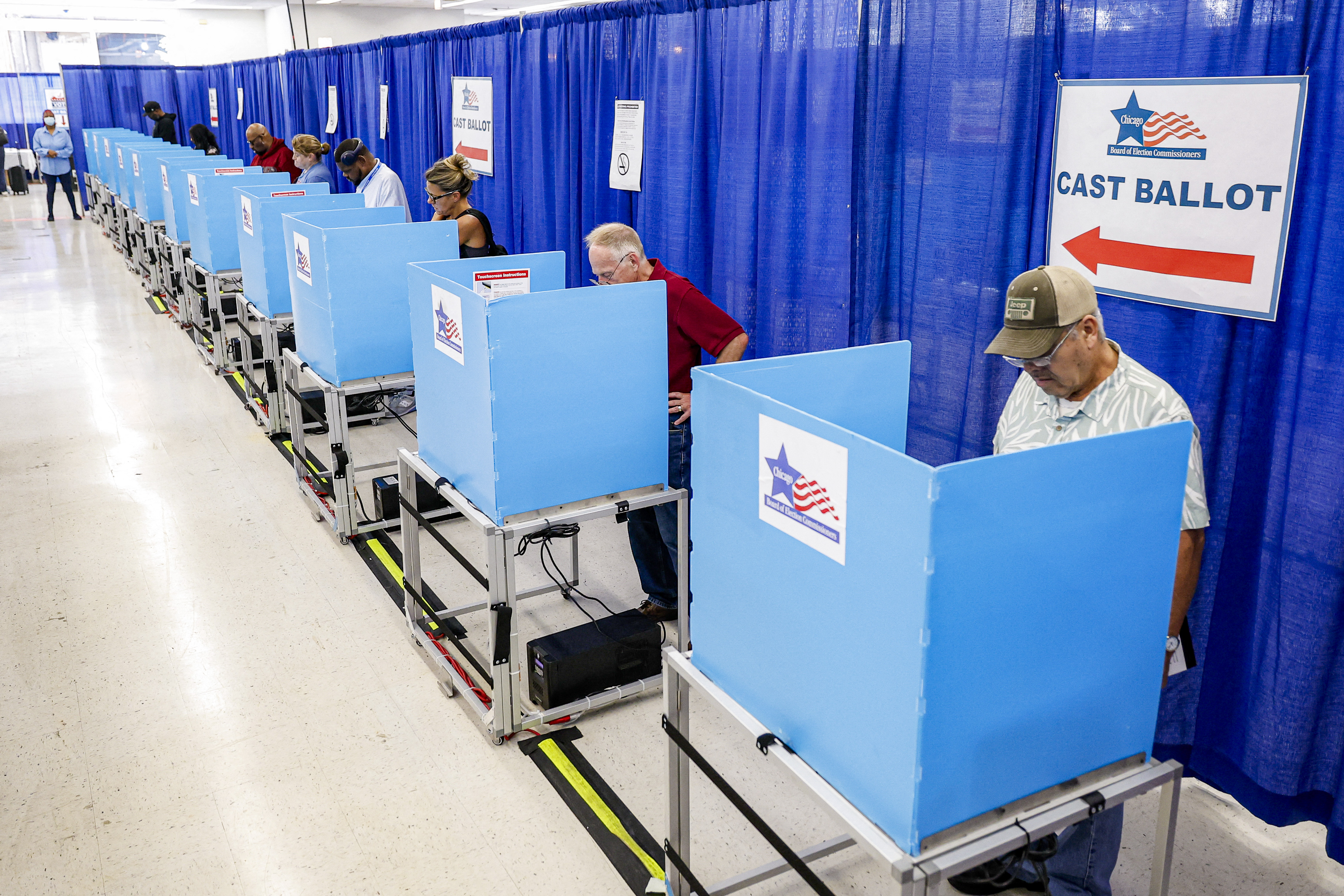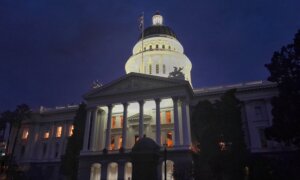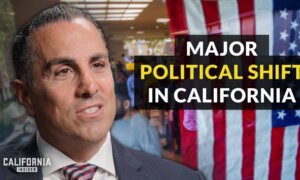More than 50 million Americans have already voted in the 2024 election with 27 million doing so in person and more than 24 million casting ballots through the mail, according to tabulations by the University of Florida Election Lab as of Oct. 29.
That’s nearly a third of the 158.4 million Americans who voted in the 2020 election.
With early voting kicking off over the weekend in Florida, New Jersey, New York, and Michigan—the first time the battleground state has offered in-person early voting—Americans in 45 states can now vote in-person before Election Day on Nov. 5.
On Oct. 30, Oklahomans begin to cast ballots early for four days, and on Oct. 31, Kentucky’s three-day early in-person period begins.
As those states start early voting periods, Louisiana closes its early polling on Oct. 29, while Maine, Tennessee, and Maryland shut it down on Oct. 31. Three states—Alabama, Mississippi, and New Hampshire—do not offer in-person early voting.
As has been the trend since the first ballots were cast in late September, Republicans are showing up in greater numbers to vote in person before Election Day compared to previous election cycles, while Democrats are casting the most mail-in votes but not in the numbers they did in 2020.
Early turnout over recent election cycles has been higher among Democrats than Republicans but, of the 26 of 30 states that register voters by party affiliation that Election Lab has data for, only 14 are reporting more early votes from registered Democrats than registered Republicans, it reported on Oct. 28.
In 2020, about 60 percent of Democrats and 32 percent of Republicans who voted did so by mail, according to an M.I.T. Election Data and Science Lab study.
That gap may not be as wide in 2024—if current trends continue—with Republicans responding to party leaders’ calls to vote early, either in person or by mail, a reversal of what unfolded in 2020, especially in northern states.
The trend is especially evident in the seven battleground states that pundits say will determine the outcome between former President Donald Trump and Vice President Kamala Harris on Nov. 5.
In Arizona, where early voting began Oct. 8, as of Oct. 27, more than 1.4 million had mailed in or dropped off ballots at the county elections office, with Republicans casting 588,782 and Democrats 485,784 of those votes, according to data posted by the Arizona Party Voter File and Arizona County Recorders.
More than 326,000 of those 1.4 million early votes were cast by nonpartisans, a key constituency in a state that President Joe Biden won by less than 13,000 votes in 2020, only the second Democrat to win Arizona since 1948.
Trump took Arizona and its 11 electoral votes in 2016 by 3.5 percentage points.
In Georgia, where a record 328,000 people voted on the first day of early voting on Oct. 15, more than 3 million—approximately 42 percent of the state’s 7.22 million voters—had already cast their 2024 ballots as of Oct. 28, according to the Georgia secretary of state’s Election Data Hub, with nearly 2.72 million doing so in person.
Voters don’t register by political affiliation in Georgia, but early turnouts were higher thus far in 2024 than they were in 2020 in a state that Biden won by 0.23 percent, less than 11,780 votes.

A sign directs voters in Wake County, N.C., on Oct. 17, 2024. (John Fredricks/The Epoch Times)
North Carolina: 36 Percent Already Voted
In North Carolina, which also set a first-day early voting record with 353,000 ballots cast on Oct. 17, more than 2.82 million—36 percent of the state’s 7.81 million registered voters—had already cast ballots by Oct. 27, according to the North Carolina State Election Board.Republicans cast 961,706, or 33.3 percent, of those early in-person North Carolina votes, about 16,200 more than the 937,910 cast by Democrats, Election Lab reported, with 920,386 nonpartisans also voting early. There was no available breakdown of the nearly 155,000 returned mail-in ballots.
Trump won the Tar Heel State in 2016 by 3.67 percent and won again by 1.3 percent in 2020. It was the only state the former president won with less than 50 percent of the vote.
In Pennsylvania, registered Democrats had cast 823,421 or 58 percent, of the more than 1.414 million mail-in ballots returned, according Election Lab.
Republicans had mailed in or delivered nearly 444,000 votes, nearly 31.5 percent, and nonpartisans 147,483 ballots, 10.4 percent. That 30-plus percent turnout by Republicans is a significant boost over the 23 percent who voted in early 2020 in the Keystone State, which Biden won by 1.17 percent after Trump won in 2016 by 0.72 percentage points.
As noted by Michael Poser at Decision Desk HQ in a series of Oct. 28 posts on social media platform X, Republicans have out-gained Democrats in voter registrations 39,507 to 19,774 between Oct. 20-27.
With Oct. 29 as the last day for registered voters to request a ballot to cast an early vote in Pennsylvania, the “return rate” of requested ballots takes on added significance from Oct. 30 on, and it appears the GOP is on track to easily eclipse past early voting performances,
Democrats have a 281,081 registration advantage, “which will likely drop slightly before election day as counties complete their data entry,” Poser wrote, noting, “Republicans have net 92,500 registrations over the last four months.”
In Michigan, which does not register voters by party affiliation, during its first-ever in-person early voting period, which began Oct. 26, the state’s Election Dashboard reported late Oct. 28 that more than 1.5 million of 2.345 million who requested ballots had returned them.
More than 145,000 people voted on Oct. 26 and more than 260,000 had done so by the end of the week, the state reported. Biden won the state by 2.6 percent, about 155,000 votes.

Voters take to the ballots outside of Farmington, Mich., on Oct. 26, 2024. (John Fredricks/The Epoch Times)
In Wisconsin, another battleground state that does not register voters by party affiliation, nearly 860,000 had cast in-person votes since early voting began Oct. 22, according to Election Lab.
More than 446,140 of 1 million requested mail-in ballots had been returned and 412,022 had cast ballots in person. Biden won the state by 0.63 percentage points, nearly 21,000 votes, in 2020.
According to Nevada secretary of state numbers posted Oct. 28 by Election Lab, more than 32,000 more Republicans than Democrats had already voted—255,805, 39.7 percent, to 223,729, 34.7 percent, with 164,519 nonpartisans also voting in person early.
That advantage is fueled by a significant lead in early in-person voting, which began Oct. 19. According to Election Lab, 149,475 GOP voters, or 49.7 percent of Nevada’s 300,940 in-person early tally, had cast their ballots compared to 82,055 Democrats (27.3 percent) and 69,410 nonpartisans (23 percent).
Democrats had a 141,674 to 106,330 lead in mail-in ballots with 232,156 of 1.975 million—less than 17.5 percent—requested returned. More than 95,000 nonpartisans had returned ballots.
All Nevada voters automatically receive ballots in the mail unless they opt out and the state offers same-day registration on Election Day. Biden won Nevada by 2.4 percentage points, less than 34,000 votes, in 2020.
This article was updated with early voting figures on Oct. 29.














